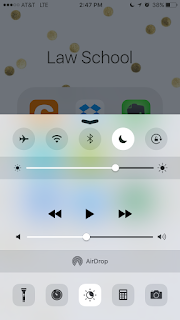At my school, everyone is required to participate in Moot Court as a pass/fail part of LRW. We could pair up with any 1L and then competed against the entire 1L class for a chance to argue in front of appellate justices. The hardest part was that we had to argue both sides back to back, so by the second time my partner and I were mixing up our arguments over if there was or wasn't a constitutional right. Unfortunately my partner and I did not advance to the second round, which consisted of only the top 16 teams. But that doesn't mean that I didn't learn a lot!
What is Moot Court
Mock trial was a big thing in my pre law fraternity, but I never really got involved. So when moot court came up, I had no idea what I was doing. For those of you who aren't really into these either, mock trial is more where you question witnesses and argue in front of the judge and moot court is more for appeals where you just stand at a podium and talk to a judge. While these are different, I do wish that I would've at least tried my hand at this before I got to law school so I wouldn't feel so clueless.
What you wear
Before we started moot court, a 3L from my school's official team gave us a presentation about what to expect and one thing that he pointed out was that the dress code was strict. "Business Professional" like what you'd see on Pinterest still isn't business-y enough. This has to be Court Room Professional. Black pant suit or a skirt suit with skin-colored panty hose. No tight skirts and skirts should end right around the kneecap. White, peach, or pale pink button up or blouse. No cleavage whatsoever. Close-toed, black heels less than three inches, preferably not patent leather. Nude or pale pink nails. Natural makeup. Stud earrings and minimal jewelry. Hair out of your face. No bold colors and preferably no patterns. The rules were pretty strict, but I did feel like a total badass looking so professional.
What happened
The only people in the room where the four speakers, a 3L (judge), and the timekeeper (bailiff). The order goes like this: Speaker 1 for Petitioner speaks on issue #1 for 7 minutes, Speaker 2 for Petitioner speaks on issue #2 for 10 minutes, Speaker 1 for Respondent speaks on issue #1 for 10 minutes, Speaker 2 for Respondent speaks on issue #2 for 10 minutes, Speaker 1 for Petitioner rebuts Respondents for 3 minutes. This is why it's very important to have comfortable shoes because your feet will start to hurt after standing in one place for so long.
When you go up there, you should have your main arguments outlined in 1-2 pages and a case list. The arguments should really be in bullet points so that you can't allow yourself to read from them. Your case list should have a list of all of your cases, with each case having one sentence summarizing the facts and one sentence summarizing the rule. You'll also want to know what level in the courts that this case made it to and in what jurisdiction. Our arguments were summaries from our briefs because we argued over the same hypothetical issue.
Don't think that you actually have to memorize a 10 minute speech!! Your judge will constantly be bombarding you with questions so in reality you might not even make it through your first argument. Because of this, you really need to start off summarizing the outline of your arguments so that even if you don't get to elaborate on argument two, you still got to mention it. Also, make your arguments concise so that you can cover more ground before getting cut off, because you can always go back and elaborate if you have leftover time.
What I learned
Moot court is all about presentation.
Keep your hands on the podium and don't fidget or move around.
Eye contact is very important.
To maintain eye contact with your judge, memorize your opening and closing statements!
Use your most formal language.
Never cut off or interrupt your judge.
Always begin your response to your judge with Yes or No Your Honor.
Try to answer each judge's question by citing to a case.
Answer a question before continuing. Don't say I will answer this later or my partner will address that issue. Answer. The. Question.
Relate your judge's question to what you say next after answering.
Properly answering questions and your procedure are a little bit better than a strong argument.
Use your opponent's own case against them.
Taking a pause is better than mumbling "um."
Make sure that your arguments are based on facts, not emotions.
Don't be afraid to BS a little if you start to get stuck :)
Be assertive — tell the court what it should do and why.
Don't use I, we, or my client. Instead use the name of your client (Mr. Jones) and call the opposing party by either Petitioner or Respondent. [but not the Petitioner/Respondent]
Most of your time will be spent answering the judge's questions.
Remind yourself to speak slowly, calmly, and clearly.



































